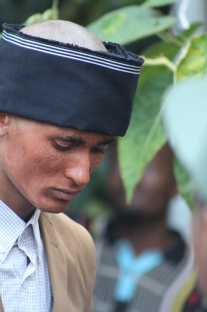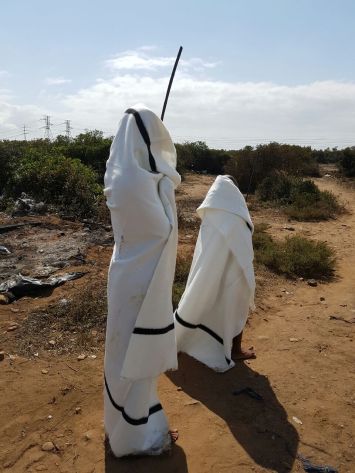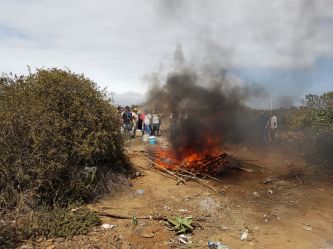This piece first appeared in The Herald on 12 January 2017
December holidays in South Africa, perhaps more than anywhere else in the world, are a glorious celebration of idleness; an annual reminder to all of us that there is so much more to this life than working for a boss.

But, other than idleness, December in our region is also dominated by significant “cultural” and “traditional” obsessions. In my family, we follow both Xhosa and European traditions, so December means Mgidi season and Christmas season. This year was particularly intense as my second son (recently matriculated) went to the bush to participate in the thousand year old Xhosa tradition of circumcising boys and initiating them into manhood. So, this December was not just about attending the various celebrations as a guest, but rather hosting a huge feast (called an Mgidi) in my back yard in Walmer.
Of course, once everything was done with the Mgidi, the marquee taken down, the last of the ox eaten and the last Mqomboti drunk, I quickly got into Father Christmas mode and rushed off to the mall to get the gifts, the turkey, the gammon, the crackers and all the other paraphernalia that is absolutely required to make Christmas a success. It all worked out well and so many of our friends are patting us on the back for being “multi-cultural” and for “promoting diversity”.
But I have been thinking about this a little over the holidays, as the fog of burnout begins slowly to loosen its grip on my brain. I really don’t want to make myself unpopular, but I am just no longer sure that all of this talk of “embrace your culture” and “be proud of your roots” is going to be good for us in trying to build a society and a culture that attempts to pull together in the same direction. The thing is that your family traditions (be they Diwali, Imisibenzi or Christmas) are very, very useful tools at making you feel part of “the group”. There are so many little rules in these cultural events that we all “just know”. Those of us that celebrate Christmas know that Father Christmas comes down the chimney, not through the front door; we know that gifts must be wrapped and shiny paper and must be given on 25 December. We know that the Christmas dinner must include a turkey and that it is absolutely essential that you wear one of those flimsy paper hats while you eat.

Those of us that attend Mgidis “just know” that the young man will come home from the bush in the morning to the loud bashing and clanging of pots. We know that he must be adorned in a clean white blanket and must carry a blackened stick. We know that he will be smeared in red clay by his sister and given a new name. Knowing all these rules and sub-rules makes us feel comfortable, makes us feel part of something larger than us.
But the truth is that cultural events like Christmas, Bar Mitzvahs or Mgidis originated at a time when everyone around us in any direction for a thousand kilometres spoke the same language and held the same beliefs. Cultural events were therefore a comforting and regular reminder that we are all on the same page. The reality of course is that we don’t live in that world any more. So, my fear is that the very same cultural events that evolved all over the world to make communities stronger are now having the opposite effect in an age of multiple overlapping Diasporas. What we call “culture” has the very real effect of making someone who does not know all the little rules feel like an outsider and in a very real way, unwelcome.
I may have lived next door to Greek neighbours for ten years but would still feel like I don’t belong at a birthday party where there is bearded guy dancing in circles while his mates chuck the crockery on the floor.
Otherwise intelligent friends of mine speak about South Africa being a cultural “melting pot”, where the (completely unscientific) belief is that if each family just keeps on following the same routines that our great-great grandparents did, that we will somehow magically develop a new culture and tradition that is uniquely South African. I’m sorry, but I just don’t see it. What I see from where I am standing is arrogant conservative backlash that says “this is how we have always done things and to hell with all of you!” I know that Trump supporters and Brexit people may tell you otherwise, but this mind-set can only be a recipe for extinction.

So what can we do? My suggestion is that we begin to discuss the challenge of culture, but not from the perspective of trying to conserve some dying detail, but rather from the perspective of “What aspect of my family’s tradition can I soften, explain or modify to make accessible to everyone? What can I do make it easier for those around me to understand and participate in?”
And another thing: Get over yourself! It’s just not that serious! These traditions are just a game that we play. Because deep down, in our quiet time, each of us know that we are so much more than the language we speak or the village we come from.
Let’s lighten it up a little!

I agree with you, Tim. I grew up in a social grouping that was artificially deliniated by the old regime. A grouping of people who dont fit it a neat box, subjected to the arrogance of those who feel ‘naturally’ their culture renders them superior and scorned exactly for the reason of not having one clearly defined culture. The reality is thing is there’s always one dominant culture that effectively subjugates the rest. So even if you play at combining, melting or merging, the dominant culture will always view it as an abberation.
LikeLike
You make an interesting observation and I like the fact that you seam to know and respect these different cultures and the rituals.
My suggestion going forward is for all of us to try and understand and respect each others cultures and rituals because they are what defines us as people. I don’t think we need to force change but lest be reminded that culture does change over time.
LikeLiked by 1 person
Morning Tim
As you know I always take interest in your articles/ topics you table for discussion.
Thanks for sending me your latest article, more so in the light of me having not been able to make it, to your son’s “mgidi”.
I am still committed to meeting the young man hopefully before end of January.
With respect to your article, I have the following comments to make:-
Your article contributes and recognises the fact that we are “a nation in transition” . Transition in a number of ways:-
• Politically,
• Economically and
• Culturally.
Although there seems to be a fair amount of dealings with respect to socio-political and economic issues; contrary, there appears to be a lot less energy being devoted to socio- cultural side of things.
Yes musically, there seems to be a notable progress towards recognising South Africans as becoming “one people”, whereas in other art forms and in “field of traditions and customs”, (the area I perceive to be the thrust of your thoughts” indeed there seems to be very little debate being put out there on the fore. (This is one of the areas I believe the research units of our institutions of higher learning are failing us as a developing nation). It could also be argued that the slow pace on these aspects score is due to the “complex nature of the notions defined as “tradition” or “culture” or“custom”.
It is therefore my contention that the fusion of diverse cultural customs and traditions we have in our country, should be allowed to take its course and develop naturally. On this score; my wife enjoys a specific programme on TV, which features weddings.(of course her interest is primarily the various bridal gown designs, and wedding gear that goes with it as that goes with her type of work). I am mentioning this in the context of what we are discussing in that on few occasions I have watched this programme with her, there appears to be a growing number of couples who get married across various cultural and religious backgrounds. As a result of this, in most instances you find that the cultural customs/ rituals related to each of the parties who enter into these matrimonial unities, get opportunities to showcase their background rituals, thus allowing their various partners into their respective family customary spaces. This indicates recognition of beauty and respect of unity in diversity. To me,
• this is but one example which could eventually lead to the cultural fusion most of us hope for in the future.
• I believe that this one example might eventually lead to “a new culture” which might possibly be embraced by most South Africans.
Naturally culture and tradition evolve, but this evolution can only come to pass through aforementioned practices, and or such as the one your family has just come through. Ordinarily, most people do not find it easy to move out of their comfort zones and venture into new “untried” and “untested” avenues. We have experienced this ourselves previously and currently even in our day to day business practices.
• You must remember the resistance that came with the introduction of computers (CAD systems) into our profession, whereas today it has become almost a natural phenomenon.
• You are aware of the daily outcry from most of our colleagues, with respect to the new system of procuring professional services, and yet as a company, we are already devising means of embracing and becoming part of this “new work procurement culture” that is developing, simply because we choose to be open minded and progressive in our approach, so that we can continue doing what we love and have been trained to do.
In a nutshell my concluding remarks are:-
• There is nothing wrong in one embracing and valuing one’s cultural and traditional background. This value defines one’s self; as long as one keeps his/her eyes and heart open to great opportunities the future holds in store for him/her.
• There is great value in the notion “that one needs to know where one comes from, in order for one to know where they are going”.
That is just my two cents worth!!
Kind regards,
Sindile Ngonyama
LikeLike
My late father did not believe that you had to acquire a name because you had got into a religion (sometimes called baptism). I am one of the lucky few who kept his indigenous name from scratch to date. Also, we had a family culture that did not take taboos and rituals too seriously. We frowned upon those that appeared shackling and laughed off those that were clearly ridiculous. Now I live most of my life outside my so-called comfort zone and this was like training of sorts! Thank you for what I find a refreshing yet familiar discourse. I will now find words to define myself further!
LikeLike
Great article! May we indeed mature into a people that embraces the beauty of our now diverse cultures – knowing that we all hold a piece of the puzzle and together we will see the full picture.
LikeLike